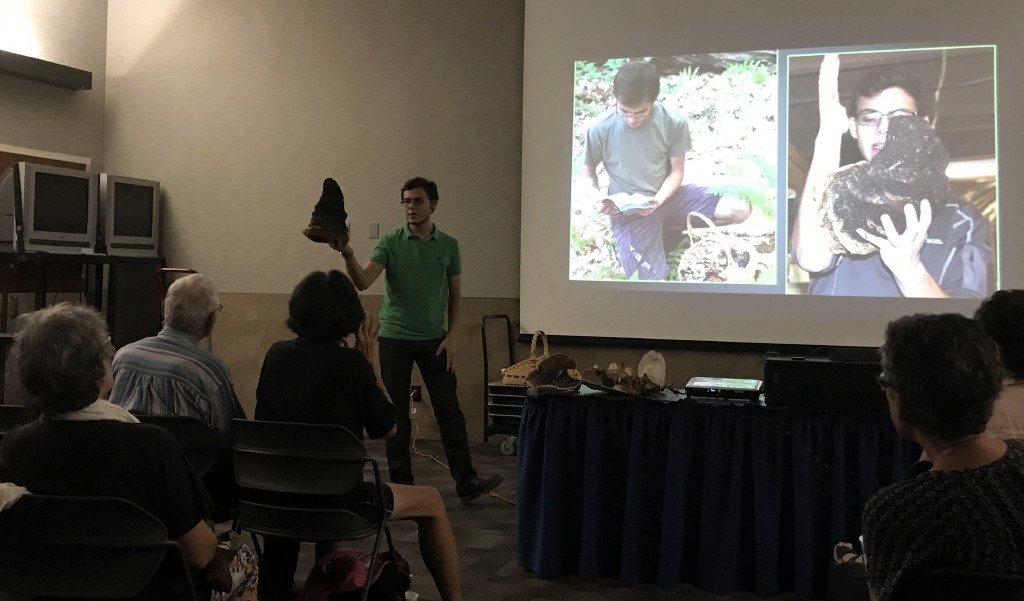EAST BRUNSWICK–Showing how to identify, consume and collect nature’s most famous forest fungi, mushroom expert Garrett Kopp taught residents about the “king of herbs.”
Kopp of Tupper Lake, New York, is a mushroom identification expert and is certified by the New York State Department of Agriculture and Markets.
Kopp is also the founder and owner of Birch Boys Chaga LLC, which sells tea and other products that are made from the Chaga, Red Reishi, Turkey Tail and Lion’s Mane mushrooms.
More than 20 residents attended Kopp’s lecture and tried Kopp’s Wild Chaga and Maple Chaga tea on Oct. 10 at the East Brunswick Library.
Kopp currently is a student at Clarkson University in Potsdam, New York, and is enrolled in the university’s innovation and entrepreneurship program.
“My entry into the mushroom world was with Chaga mushroom … which looks like a big piece of burned charcoal. Chaga is one of the most unique mushrooms, it’s my favorite, and I learned about this when I was 15 years old,” Kopp said. “I used to mow my grandmother’s lawn and came in to get a drink and I opened up her refrigerator and found this big jug of what I thought was iced tea. … She walks in and saw what I was drinking [and said], ‘Oh my God you are drinking a mushroom’ and she taught me all about the ‘king of herbs.’”
After conducting his own research, Kopp said he learned that Chaga mushrooms have more antioxidants than any naturally occurring fruit on earth. He said he was always an outdoorsman and started seeing Chaga on birch trees, so he began selling Chaga tea at local farmers markets when he was 15 years old.
Kopp said during his freshman year of college, he decided to start Birch Boys Chaga and has a store called The Chaga Shop in Tupper Lake.
“The reason you want to drink Chaga rather than eat it is because it’s [partly] made out of keratin, which is very hard keratin is what makes our fingernails, and it’s really bad for your digestive system,” Kopp said. “So when you brew it into a tea not only can it extract more of the benefits, but it’s also the most healthy when you drink because it’s not bad for us.”
Kopp said 2018 was the record high of mushroom poisonings in New Jersey. He said that many people get poisoned by mushrooms because some non-poisonous mushrooms look similar to poisonous mushrooms.
“Only sometimes can a mushroom have scales and a lot of the mushrooms I found around here … were found right around the library [with scales]. Most of the mushrooms that have scales come from the Amanita family, which is typically pretty poisonous,” Kopp said. “It makes sense we found a ton of those right off the bat … so be very careful and don’t eat mushrooms with scales.”
Kopp said normally he would just advise that people stay away from little brown mushrooms.
“In New Jersey, what I found is that the Death Cap mushroom and the Destroying Angel mushroom are white mushrooms,” Kopp said. “Be very careful because the two of the most deadliest mushrooms in the world are white and they are the Death Cap and Destroying Angel. … So don’t always stay away from little brown mushrooms, stay away from little white and tall white [mushrooms].”
Psilocybin mushrooms are mushrooms that will make someone hallucinate, and there are about three species that grow in New Jersey. Residents should not go looking for them because they fall into a category that mushroom hunters call “little brown mushrooms” which are very dangerous, according to Kopp.
“Chaga, I like to refer to as the ‘superhero mushroom,’ it gives you energy and it’s not like caffeine, it’s caffeine free, but the energy give you is because it contains polysaccharides which help your body convert the food you eat into usable energy,” Kopp said. “You won’t feel it until a little bit after you drink the Chaga. It’s high in antioxidants, that makes it very anti-inflammatory. When I started this business it was really just because I was drinking Chaga.”
Kopp said the Red Reishi mushroom has a lot of similar properties as Chaga, but it has more of a calming and relaxing effect. The Lion’s Mane mushroom is a nootropic, which means it doesn’t have effects on anything else someone is taking, making it safe to consume. Additionally, healing mushrooms include Turkey Tails, Maitakes, Cordyceps and Tremellas.
To get the nutrients from mushrooms, Kopp said residents can make dried powders, teas and/or tinctures.
Gourmet mushrooms that can be found in New Jersey include: Meadow mushrooms, Morels, Oyster mushrooms, Shaggy Mane, Yellow Gilled Russula, Chicken of the Woods mushrooms, Common Puffballs, Lobster mushrooms and Chanterelles.
If residents want to identify a mushroom, Kopp said they should purchase the “National Audubon Society’s Field Guide to Mushrooms” that describes each type of mushroom in detail. He said residents can also take a spore print by removing the mushroom’s cap, getting a piece of paper and placing the mushroom with the cap down, and taking a cup/jar to cover the mushroom.
Kopp said residents can learn more about the mushrooms in their area by visiting the New Jersey Mycological Association’s website.
For more information, visit www.njmyco.org or www.birchboys.com/apps/help-center.
Contact Vashti Harris at [email protected].

